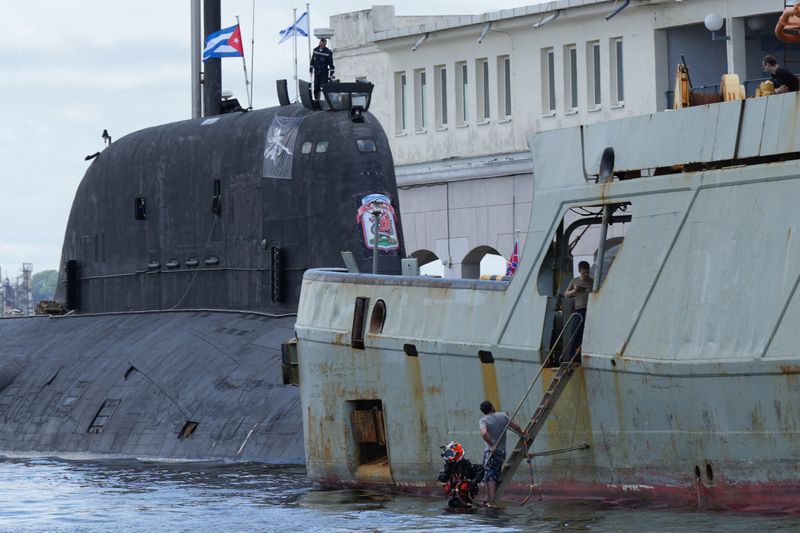By Dmitry Antonov and Nelson Acosta
MOSCOW/HAVANA (Reuters) - Russia said on Thursday that the United States should not be nervous about Russian warships in Cuba but that the West appeared deaf to any diplomatic signals from Moscow and only took notice when the army or navy took action.
A Russian navy frigate and a nuclear-powered submarine churned into Havana harbour on Wednesday, a stopover the U.S. and Cuba said posed no threat but which was widely seen as a Russian show of force as tensions rise over the Ukraine war.
White House national security adviser Jake Sullivan said there was no evidence of Russia transferring any missiles to Cuba, but that the U.S. would remain vigilant.
When asked about purported nervousness in Washington over the fear that Russia could transfer military personnel to Cuba or even create a military base on the island, Kremlin spokesman Dmitry Peskov said such exercises were common practice.
"This is a normal practice for all states, including such a large maritime power as Russia," Peskov told reporters. "So we don't see any reason to worry in this case."
The Admiral Gorshkov frigate and the nuclear-powered submarine Kazan, half submerged with its crew on deck, sailed into Havana harbor on Wednesday after conducting "high-precision missile weapons" training in the Atlantic Ocean.
Cuba's foreign ministry said the vessels carried no nuclear weapons, an assertion echoed by U.S. officials.
When asked what signal Moscow was sending, Russian Foreign Ministry spokeswoman Maria Zakharova said the West never appeared to take notice when Russia sent signals through diplomatic channels.
"As soon as it comes to exercises or sea voyages, we immediately hear questions and a desire to know what these messages are about," Zakharova said. "Why do only signals related only to our army and navy reach the West?"
"Why does the West remain completely deaf, and then comes up with the most powerful campaigns to prevent Russian signals from entering its information realm?"
TOURIST ATTRACTION
The Russian warships were docked at Havana's cruise ship terminal on Thursday, just 100 miles from Key West, Florida.
Cubans and tourists on holiday viewed the ships from a distance, and dozens formed a queue under the hot Caribbean sun for the opportunity to go aboard the frigate.
"The United States need not worry," said Havana resident Ariel Vera, a 55-year-old state worker who was among the first in line. "Cuba is a country of peace and our Russian friends are coming on a friendly visit."

The Russian vessels are expected to remain in Havana until June 17, Russia's defence ministry has said.
A Canadian navy patrol vessel, the Margaret Brooke, is also expected to arrive in Havana on Friday, Cuba and Canada have said, and will be docked not far from the Russian fleet inside the harbor.
